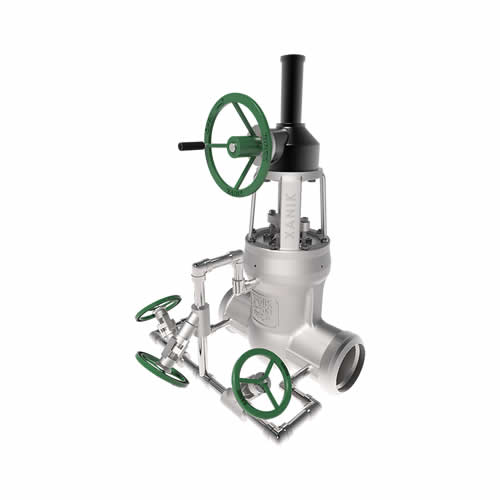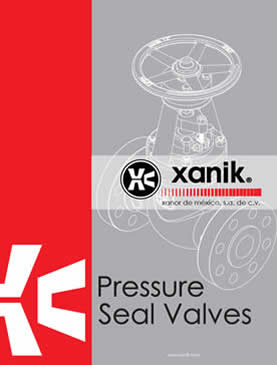XANIK
XANIK VALVES
Pressure Seal Gate Valves
Xanik pressure seal valve designs are available in gate, globe, swing check, stop check, lift check, tilting disc check valves and are installed in a wide variety of high pressure and high temperature applications including main steam, reheat, feed water, catalytic reforming, as well as other applications in power, steam assisted gravity drainage (SAGD), refining, petrochemical, and other process industries.
- Design features of Xanik pressure seal valves
- Detachable yoke without affecting the body bonnet joint.
- Integral “T” head stem construction for packing and wedge auto aligning.
- Integral “T” head stem construction for packing and wedge auto aligning.
- Integral “T” head stem construction for packing and wedge auto aligning.
- Self-Aligning two pieces packing gland.
- Flexible graphite packing with anti-extrusion rings for optimum seal ability and life.
- Live loaded packing – optional
- Seal gasket load ring withstands upward thrust of bonnet load; backing ring distributes pressure uniformly to load ring; metallic silver-plated seal gasket provides tight closure.
- Integral backseat, Stellite hard faced.
- Flexible Wedge, fully guided, wedge and seats are hard faced with Stellite 6 or Tribaloy® T-900.
Flexible Wedge
- Fully guided, wedge and seats are hard-faced with Stellite No. 6 or Tribaloy® T-900 for longer life.
- The wedge gate valve is one of the first choices of isolating valve, with good sealing capabilities and low fluid friction losses.
- The wedge is effectively clamped between two full-bore seats and seals on both sides.
Parallel Slide Disc
- Auto aligned, fully guided, disc and seats are hard-faced with Stellite No. 6 or Tribaloy® T-900 for longer life.
- Inner springs compensate for thermal deformations due to high temperature.
- The parallel slide disc is suitable for applications where significant temperature changes occur and where valve body distortion may be a problem.
Pressure Equalizing
In the case of the conventional double-seated parallel gate valves, thermal expansion of a liquid trapped in the closed valve chamber will force the upstream and downstream discs into more intimate contact with their seats and cause the pressure in the valve chamber to rise. This higher stress may make it difficult to turn the handwheel to raise the disc, and the pressure in the valve chamber may rise too quickly leading to a leak or body deformation. Valves facing this scenario require a pressure-equalizing connection between the valve chamber and the upstream piping to accommodate thermal expansion.


